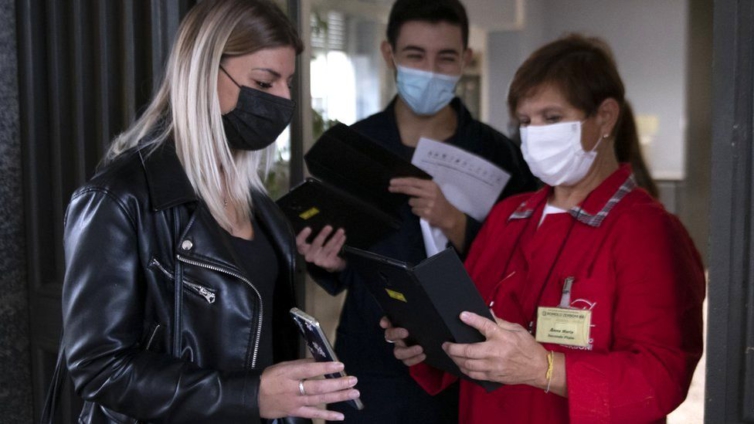Italy is to make it compulsory for all workers to have a Covid "green pass" - proof of vaccination, a negative test or recovery from the virus.
The measures are a first for Europe and some of the strictest in the world.
Anyone without a pass will reportedly face suspension from work and may have their pay stopped after five days.
The measure, due to come into force on 15 October, aims to boost vaccinations in a country that has been badly hit by the virus.
Green pass certificates for Covid-19, provided both digitally and on paper, are already required to access Italian train stations, cinemas, restaurants, gyms and swimming pools.
School staff are also required to show a pass and some teachers have reportedly been turned away from work.
On Thursday, the Italian government approved a new law to extend the requirements to all workplaces and employees across all sectors, including the self-employed.
Businesses and staff could face fines of up to €1,500 (£1,280) if people are found to be working without a valid green pass.
Announcing the decision, Health Minister Roberto Speranza said the new measures would improve safety and "make our vaccination campaign even stronger".
"The implementation of a pass such as the one we are bringing into force with this decree will, we are certain, help us push forward this vaccination campaign," he said.
Despite a vocal anti-vaccination minority, Italians have broadly backed the government's vaccination campaign.
Nearly 65% of Italians have now been fully vaccinated, but infections have been rising, driven by the Delta variant.
Italy has recorded more than 4.6 million cases of Covid-19 and over 130,000 coronavirus-related deaths since the start of the pandemic, according to Johns Hopkins University data.
The green pass was initially introduced to make travel within the EU more efficient, and several countries have since introduced requirements for people to show the certificate for different reasons.
France requires a health pass for access to restaurants, bars, planes and trains, while Austria and Cyprus are among other EU countries to have used similar schemes.
Latest Stories
-
Paris 2024: Opening ceremony showcases grandiose celebration of French culture and diversity
3 hours -
How decline of Indian vultures led to 500,000 human deaths
4 hours -
Paris 2024: Ghana rocks ‘fabulous fugu’ at olympics opening ceremony
4 hours -
Trust Hospital faces financial strain with rising debt levels – Auditor-General’s report
5 hours -
Electrochem lease: Allocate portions of land to Songor people – Resident demand
5 hours -
82 widows receive financial aid from Chayil Foundation
5 hours -
The silent struggles: Female journalists grapple with Ghana’s high cost of living
5 hours -
BoG yet to make any payment to Service Ghana Auto Group
5 hours -
‘Crushed Young’: The Multimedia Group, JL Properties surprise accident victim’s family with fully-furnished apartment
6 hours -
Asante Kotoko needs structure that would outlive any administration – Opoku Nti
6 hours -
JoyNews exposé on Customs officials demanding bribes airs on July 29
7 hours -
JoyNews Impact Maker Awardee ships first consignment of honey from Kwahu Afram Plains
8 hours -
Joint committee under fire over report on salt mining lease granted Electrochem
8 hours -
Life Lounge with Edem Knight-Tay: Don’t be beaten the third time
8 hours -
Pro-NPP group launched to help ‘Break the 8’
8 hours

